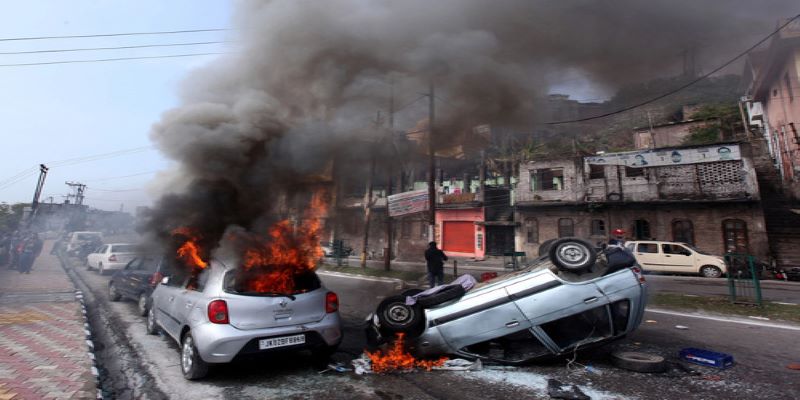
Source: PTI

The emerging khalistan problem has taken the center stage as a series of violent incidents have recently made headlines. There have been reports of violence and threats carried out by khalistani militants in the far west, Australia and even in heartland Punjab. These militants have used drones to regularly supply drugs, firearms etc., in an attempt to revive the khalistan movement in an otherwise peaceful Punjab. The khalistan issue was recently discussed at a high-level meeting in New Delhi of top cops. The meeting was also addressed by Prime Minister Narendra Modi. At the meeting, the threat from khalistani militants was emphasised by police officers as a matter of serious concern, among other security challenges that were flagged
"ISI’s role in fuelling Khalistani activities in western countries through aggressive propaganda, supply of material and logistic support is well-known, documented and chronicled."
ISI’s role in fuelling khalistani activities in western countries through aggressive propaganda, supply of material and logistic support is well-known and documented and chronicled.
Pakistan continues to support the agitations.
However, there is no room for complacency in this matter, as evident from recent incidents involving khalistan militants indulging in acts of vandalism in Melbourne and other parts of Australia, which have only added to ongoing concerns. Judging by these developments, security experts feel that on expected lines, Pakistan continues to be the villain in mobilising khalistani agitations beginning from Canada, the US and other parts of Europe and even within India.
"Pakistan’s powerful military establishment and the ISI remain possible causes of peril to Indian security interests and New Delhi needs to maintain a high level of professional preparedness to safeguard its security interests."
These disturbing developments are a testament to the frustration of the Pakistani Inter-Services Intelligence (ISI), which failed to create the so-called Khalistan as a new State in the eighties despite its persistent efforts. Hostile forces are once again attempting to cause disturbance in India. This is particularly concerning as India has recently assumed the G-20 leadership and holds a crucial position globally. ISI’s role in fuelling khalistani activities in western countries through aggressive propaganda, supply of material and logistic support is well-known, documented and chronicled by German Scholar Hein G Kiessling in his book on the ISI. It is, therefore, not surprising that our next-door neighbour will not venture into further misadventurism to divert its public’s attention from prevailing domestic ills as well as to hurt India apparently to avenge its humiliating defeat in 1971 and resulting creation of Bangladesh.
Besides the khalistani issue, it is well known that the ISI systematically supports homegrown terrorists by training and dispatching them to carry out attacks in India. The memories of the 26/11 attacks and the attacks on Uri, Pathankot and Pulwama are still vivid in public memory. The ISI’s blueprint for such attacks remain readily available.
Online indoctrination programmes
Ever since the rise of ISIS under Baghdadi in 2010 in the aftermath of collapse of the Saddam regime in Iraq and Gaddafi’s end in Libya, coupled with an uprising in Syria, several otherwise peaceful countries reeled under the ISIS threat. More worryingly, there were vibrant online indoctrination programmes that led to massive radicalisation. A small section of Indians got drawn towards this, more out of glamour and curiosity, than true commitment. However, strict oversight by security agencies kept the situation under control. While radical elements from Indonesia, Bangladesh, Maldives and other countries responded emotionally and physically to ISIS online overtures, the response from such elements in India was feeble.
In the context of discussions on India’s security challenges, it is important to take into account the security situation in its immediate neighbourhood, particularly Bangladesh. The country has seen several incidents of religious extremism and deadly terror attacks targeting minorities, places of worship, liberal and LGBT activists in a society where religion plays a highly politicised role. Further, the presence of nearly 1.3 million Rohingya refugees adds to the vulnerability of religious indoctrination. This is a major concern for Bangladesh intelligence agencies. Also, fanaticism remains a key threat in Bangladesh due to a large number of religious fundamentalists in political parties and outfits like Hefazat-e-Islam Bangladesh, Jaish-e-Mohammed (JeM), Harkat-al-Ansar etc. who have linkages across the border in India which increases the threat to India’s security and requires increased alertness.
"A beefed-up intelligence machinery and an equally compatible security apparatus is imperative particularly in view of religious conflicts in various parts of the world."
Other than Bangladesh, Sri Lanka also poses a security concern for India. Despite its fragile polity, the island saw a series of violent terror attacks in 2019, known as the Easter bombings, targeting several churches. The radicalised perpetrators are suspected to have strong connections in southern India thus heightening India’s security concerns.
The Maldives, a thinly populated island on the Indian Ocean, has a large number of radicals and worryingly a large number have joined ISIS and fought in Syria. This trend, close to the Indian shores, calls for increased vigilance on these elements and their contacts in India.
Incidents of religious violence in other parts of the world including France (attacks at Charlie Hebdo), Belgium, Holland, and Germany in Europe and in Somalia, Mali, Mauritania and Burkina Faso in Africa are a matter of deep concern. These incidents can have an impact or embolden young and impressionable minds and India is no exception to such a possibility. Recent incidents of alleged Quran burnings in Denmark and Sweden have caused angst among a certain community in India too. This may serve as fuel to extremism and is not very conducive to security demands. While the threat of Naxalism in some parts of India appears to be on the wane, it is still important to maintain vigilance and not let our guard down.
The penetration of Indian cyberspace by hostile quarters and circulation of Fake Indian Currency Notes (FICN), pose real time security threats to the Indian establishment. To effectively address these challenges, a beefed-up intelligence machinery and an equally compatible security apparatus is imperative particularly in view of religious conflicts in various parts of the world including religious and political instability in Afghanistan and Pakistan, fallout of the ongoing Russia-Ukraine war plus a delicate communal situation calls for India to address the challenges with renewed vigour and resolve.
(Exclusive to NatStrat)